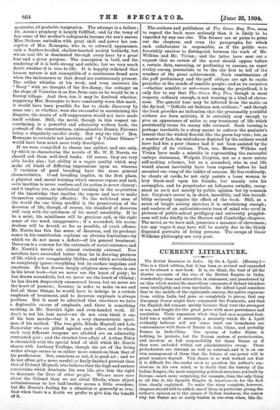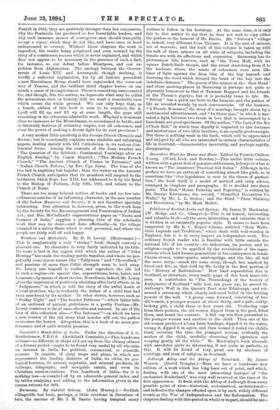CURRENT LITERATURE.
The British Dominion in India. By Sir A. Lyall. (Murray.)— This is a third edition, but it has been so revised and expanded as to be almost a new book. It is, we think, the best of all the shorter accounts of the rise of the British Empire in India, wonderfully clear and attractive in statement, and penetrated by an idea which makes the marvellous conquests of distant islanders seem intelligible and even inevitable. Sir Alfred Lyall considers that in the middle of the eighteenth century, the native organisa- tions within India had gone so completely to pieces, that any European Power might have conquered the Peninsula, and that the English did conquer mainly because they were the strongest at sea, and fought for the great prize with more persistence and resolution. Their expansion when they had once acquired foot- hold was a matter of necessity, a necessity which Sir A. Lyall evidently believes will not cease until our boundaries are conterminous with those of Russia in Asia, China, and probably France in Indo-China. Our system of buffer States is nothing, he protests, but the Roman system of protectorates, and involves as full responsibility for these States as if they were included within our administrative sweep. These protectorates are internal as well as external, and it is on our wise management of them that the future of our power will in great measure depend. This thesis is so well worked out that it is difficult for the reader even to question the author's con- clusions in his own mind, or to doubt that the history of the Indian Empire, the most surprising political structure yet built by Europe—much more surprising, for example, than the only thing at all like it, the Spanish Empire in America—is for the first time clearly explained. To make the story complete, however, chapters should still be added, one of them in particular giving the author's opinion as to the causes of Indian weakness, the reason why her States are so easily beaten in war even when, like tha Punjab in 1842, they are positively stronger than her conquerors, why the Peninsula has produced so few formidable leaders, and why such immense masses of courageous men should tranquilly accept a regime which they do not like, and have once at least endeavoured to overset. Without those chapters the work is imperfect, the reader being perplexed and even worried by the story of a continuous success which is never explained, and which does not appear to be necessary in the presence of such a fact, for instance, as our defeat before Bhurtpore, and our ex- pulsion from Afghanistan. The analogy between the Govern- ments of Louis XIV. and Aurungzeb, though striking, is hardly a sufficient explanation, for by all historic precedent a new Mussulman House should have superseded the worn-out race of Timonr, and the brilliant third chapter leaves on our minds a sense of incompleteness. There is something unaccounted for, and though, like the author, we deprecate what may be called the miraculous view of history, still we want a reasonable view which covers the whole ground. We can only hope that, as a fourth edition of this book is sure to be required, Sir A. Lya11 will ffil up, and fill up at some length, the gaps still remaining in his otherwise admirable work. Why had a dominant 'class so immense as the Mussulmans, so accustomed to battle, and so intensely desirous of retaining empire, lost all coherence, and even the power of making a decent fight for its vast provinces ?



































 Previous page
Previous page